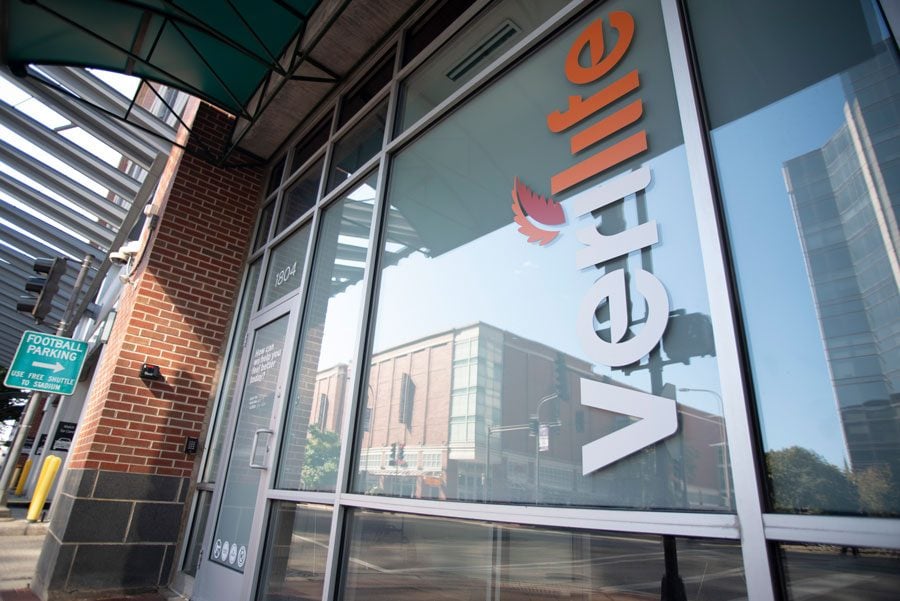Northwestern students, officials speak on legalization of cannabis
Colin Boyle/Daily Senior Staffer
Verilife Medical Marijuana Dispensary on 1804 Maple Ave. From January onwards, residents of Illinois who are 21 years of age or older may partake in recreational cannabis use.
October 8, 2019
In June, Illinois passed the Cannabis Regulation and Tax Act, legalizing the possession of up to 30 grams of cannabis for residents of Illinois who are 21 years of age or older. When the law goes into effect in January, however, it will still be against Northwestern policy for any student, regardless of age, to possess cannabis.
According to the University’s webpage on cannabis policy, the school must abide by the Drug-Free Schools and Communities Act in order to remain compliant with federal — not state — law.
“Northwestern University prohibits the possession, use, manufacture, cultivation, dissemination, and storage of cannabis by students, faculty, staff, and visitors on all of Northwestern University’s campuses and properties and at University-sponsored events,” the school policy states.
Even medical cannabis prescribed by a licensed doctor is prohibited on Northwestern campus, according to the guidelines.
Despite the University’s strict stance against cannabis, Angela Mitchell, the director of Northwestern Health Promotion and Wellness, said the organization takes a different approach.
“Since this was one of the things that Illinois Gov. J.B. Pritzker campaigned on, we anticipated when he was elected that there would be a change in the law,” Mitchell said. “So we’ve been talking about how we will educate the community about what this means for Northwestern students and the Northwestern community at large.”
According to Mitchell, HPaW focuses on harm-reduction rather than law enforcement. With the goal of educating the student body about drugs, the office does not promote the possible health benefits of cannabis but rather informs students on the effects of the substance on the body.
“While we certainly want to educate students and the larger community about the risks of using any substance, we acknowledge that everyone has free will,” Mitchell said. “If students do make the choice to use cannabis or any other substance, that they do so in the safest and most informed way possible.”
Northwestern’s Annual Security Report has shown a decrease in the number of drug-related incidents on campus. On the report’s category of “drug law violations referred for disciplinary action,” the number of violations on the school’s Evanston campus went from 48 in 2016, to 1 in 2017 and 5 in 2018.
Northwestern’s Chief Risk and Compliance Officer Luke Figora, who organized the report, said this trend may not continue come January.
“I wouldn’t expect those numbers to decrease over the next year as policing strategy and the community changes,” Figora said.
While the school has plans in place for when cannabis sale is legalized, some students are skeptical that the legalization of the substance will make much of an impact on campus.
Medill junior Evan Ochsner from Colorado, the first state to legalize recreational cannabis use, said the legalization of cannabis didn’t actually change much about the way people talk about the drug in Colorado.
“Even if legalization did change student life, I think that would have to be a gradual thing,” Ochsner said. “Just because the law might change doesn’t mean that, overnight, there’s going to be a huge change in the way people act.”
Outside of the University, the legalization of cannabis may affect how student groups talk about the substance. For Peer Health Exchange, an organization that sends college students to teach health classes at nearby under-served high schools, reduction of substance abuse is a common conversation topic.
Weinberg senior and student coordinator for NU’s PHE chapter Mary Cormier, said although the organization currently lacks programming centered around cannabis, they are open to readjusting in 2020 upon direction from their national chapter.
“Because each of our classrooms are different, we kind of let the students decide what to talk about,” Cormier said. “If (cannabis) is something that’s super relevant in their lives, and they want to bring it up, we can talk about how to use it safely.”
Email: [email protected]
Twitter: @zachblank22


